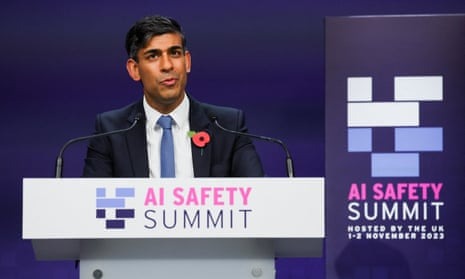Downplaying concerns about Sunak’s summit, number 10 reassures
3 min read
There are lingering uncertainties surrounding an event that is unlikely to aid the Prime Minister in achieving the goal of shaping the UK’s global approach
The attendees and potential outcomes of the AI safety summit next week are uncertain, but Rishi Sunak’s government asserts that it is a crucial initial step in addressing the continually evolving subject of AI safety.
Initial worries within No 10 about the Israel-Gaza conflict possibly leading to a shortage of global leaders at the summit have somewhat alleviated following the confirmation of the participation of European Commission President Ursula von der Leyen and US Vice President Kamala Harris.
Moreover, the UK government has secured an early victory, as a number of leading AI companies, including OpenAI and Google DeepMind, have disclosed their safety policies in response to a request from Technology Secretary Michelle Donelan.
However, the number of high-profile attendees journeying to Bletchley Park in Buckinghamshire on either Wednesday or Thursday, as well as the potential for any Chinese participation, remains uncertain.
The assembly at this renowned country estate, celebrated for its involvement in World War II code-breaking, carries personal importance for Sunak. In his address on Thursday, he highlighted the potential existential threats posed by AI while also seeking to alleviate public concerns.
Officials working alongside the prime minister for the summit downplay the emphasis on the guest list. They emphasize that the need for answers is so pressing that waiting is not a viable option, even in light of Vice President Harris’s choice to deliver a separate speech in London on the first day of the event regarding the US approach to the subject.
Sunak is briefed on the imminent release of cutting-edge AI models, crafted for a diverse array of tasks, expected to be accessible within a year. These models boast immense power, estimated to be around 10 billion times more potent than their counterparts from a decade ago, giving rise to uncertainties about their potential accomplishments even among their creators.
The official spokesperson for the Prime Minister affirmed that invitations have been extended to representatives from China, underscoring the desire to draw a diverse array of attendees and recognizing the global nature of the challenge posed by AI, which transcends borders.
The spokesperson stressed, “I won’t speculate on the attendees. Nevertheless, our goal is to bring together the right group of nations and businesses, and I am confident that we will accomplish this.”
The format of the first day will feature a comprehensive session led by Donelan, uniting ministers, technology companies, and other experts to tackle the risks and challenges posed by cutting-edge AI.
During the second day, Donelan will bring together smaller groups to explore potential regulations for the technology. Sunak will participate in discussions with what is described as “a select number of like-minded countries and companies,” with China notably excluded from this group.
The summit is not expected to generate tangible regulatory proposals, and Sunak’s aspiration for the UK to become a global hub for such initiatives remains a vision.
At the very least, he is hopeful that the UK can play a leading role in such initiatives, in collaboration with the United States. The concept for the summit originated during a visit to Washington in June.
Sunak’s spokesperson remarked, “We will work closely with the US. Given that both countries have leading companies in this field, it is only natural for both nations to be at the forefront of these efforts.



